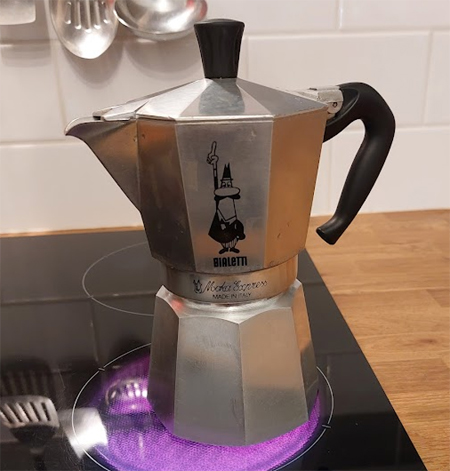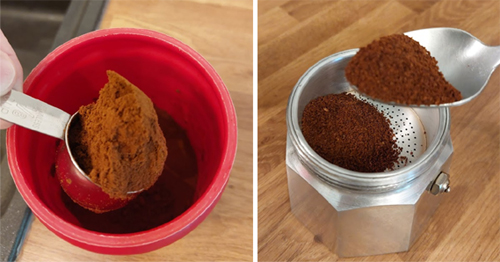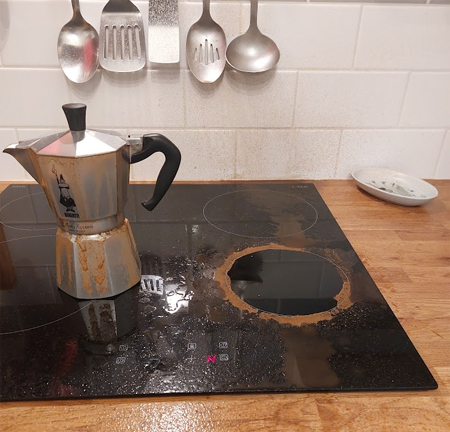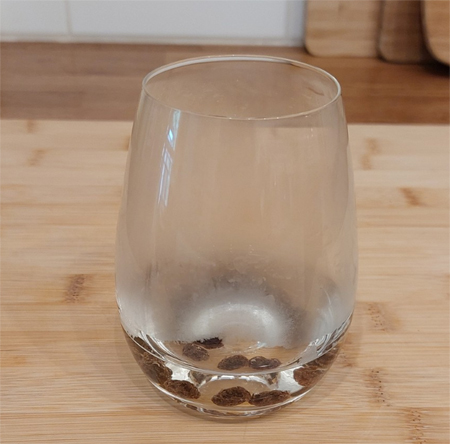A Nice Cup of Coffee
I drink decaf instant coffee: decaf at my doctor’s insistence, and instant because I don’t have the time or the space to brew it.
We do have a Mr. Coffee-type of coffee maker, in that it takes in water and coffee grounds and spits out a hot beverage, but there the similarity ends. It is larger—taking up valuable real estate in a galley kitchen that has no available land to build on—more complicated (this may have changed in the two-plus decades of my absence, but I seem to recall that Mr. Coffee was dead easy, and had just an ON button), and, although it produces passable coffee, this was not always the case.
As hinted at above, British coffee machines are unnecessarily complex, and often produce disappointing results. When I first moved here, I acquired, and jettisoned, several different types before finally giving up and settling for instant.
Then I was introduced to Bialetti by my wife’s friend’s son’s German Frau who brought her method, and, apparently, the hardware, with her on a visit. Succinctly, we were outside enjoying the summer weather and she brought me a cup of coffee, and it was the best, by God, cup of coffee I’d had in a very long time. I told her so, and she brought me into the kitchen to show me how it was done.

She had a Bialetti, which made a cup of espresso. She then mixed it with an equal amount of hot water, added milk to taste, and voilà, or more appropriately, Dort. This was quite a revelation, though it was also humbling.
You see, in my early rants about the lack of decent coffee in Britain, I also took aim at the proliferating coffee houses (and that was years ago; you should see them now—you can’t swing a cat without hitting a coffee house) and their newfangled espresso machines that took ages to prepare a coffee and then gave you, not coffee, but diluted espresso, and you can’t make coffee that way anymore than you can make a grape by soaking a raisin in water. I was, it turns out, wrong.
(However, rational people are quick to adopt a new outlook if they are presented with empirical evidence contrary to their opinion, no matter how dearly they hold it. I thought I’d just throw that out there, you know, in case anyone needs to hear it.)
I therefore purchased a Bialetti at my earliest convenience, duplicated the process and came away impressed, and just a little chagrined. The Bialetti has served me well over the years, but I only use it occasionally because it makes such a good cup of coffee that I want to be able to sit and enjoy it and, since retiring, I’ve been so busy that rarely happens.

But today, as it happens, I had an entire morning free, and some special coffee to try out. We’d bought some coffee in Cyprus to use in the coffee maker in the villa, but we never got around to it, so we brought it home. Upon opening the bag, I found, not coffee grounds, but a sort of dust. Still, it was coffee, the Bialetti is a coffee maker, so I introduced the two, and put it on the hob.
And it exploded.

Fortunately, I was a few feet away and didn’t find myself in harm’s way. On the other hand, it took forty-five minutes to clean the kitchen but, once everything was back as it should be (there was wet coffee dust as far away as the refrigerator and the washing machine) I reassembled the Bialetti, used some proper coffee grounds, and made a real, by God, cup of coffee.
And it tastes grand.
But now I’m wondering if I can make grapes by soaking raisins in a cup of water.

2 Comments
Chip
Yes -raisins do expand when put it in water. As an ex-pool maintenance chap I have many experiences where a young mum brings child 1 to swim whilst child 2 sits on the side with match-boxed packet of Sunpat raisins. Invariably some are dropped, wash in to the pool and thence are captured by the filters in the plant room. Here they sit and slowly expand until I cleaned the filters only to find something half way between a raisin and grape.
No I didn’t eat them.
MikeH
Well, I was wrong about the coffee, and I’m wrong about the raisins. Thanks for the correction.